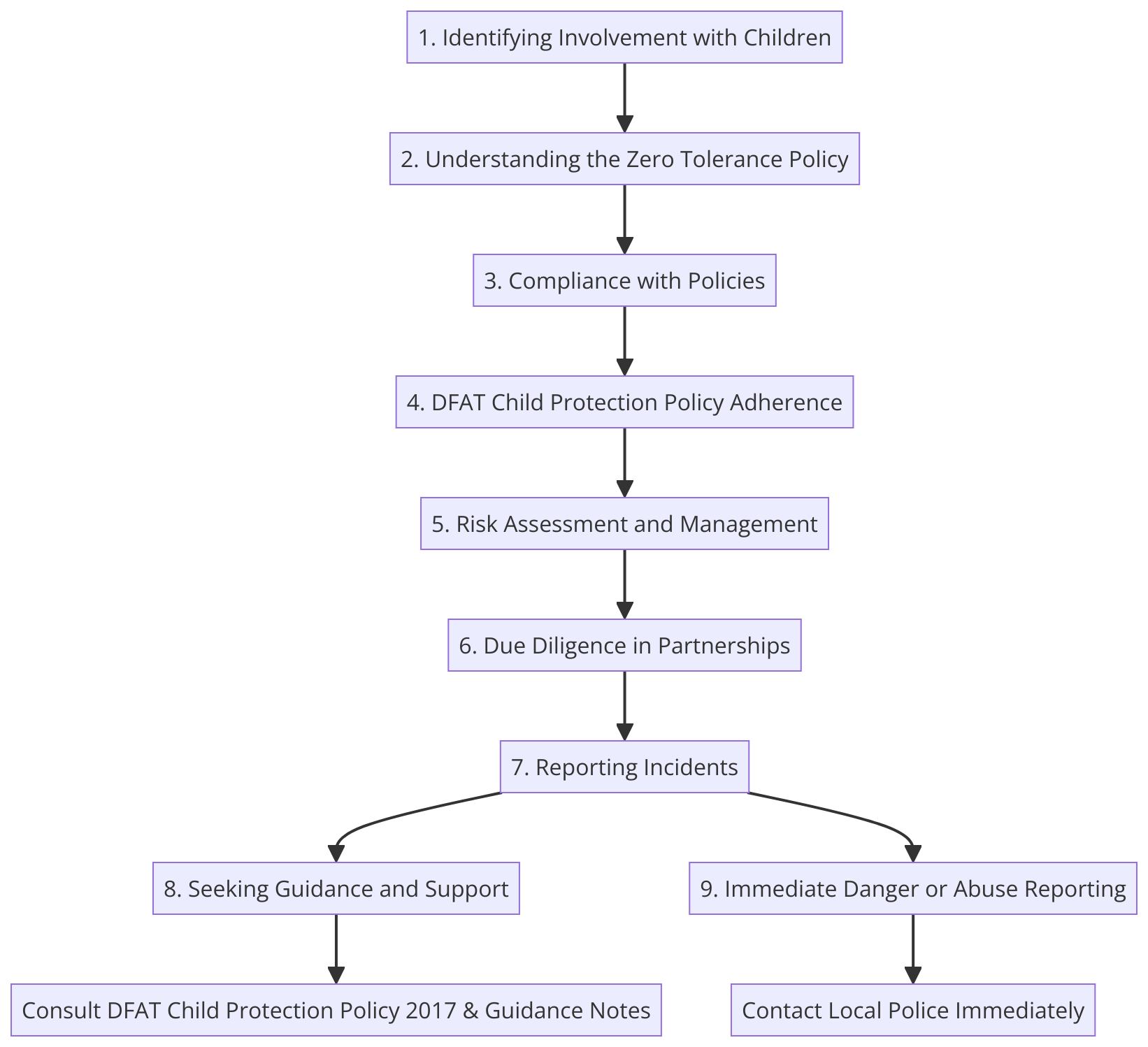Child Protection
Does the overseas activity involve individuals working with children or contact with children? If you are working with an institution or provider, is the organisation child-focused and what child protection controls are in place?
The Department of Foreign Affairs and Trade (DFAT) has a zero-tolerance approach to child exploitation or abuse.. DFAT recognises that it is the shared responsibility of all adults to prevent child exploitation and abuse - see DFAT Child Protection Policy. In Australia, there is recognition that organisations that work with children also have a role in protecting them and need policies and procedures to enable them to do so. The DFAT Child Protection policy sets out expectations and requirements for all delivery partners to act in accordance with the policy principles outlined in the document, and abide by their own relevant policies, international declarations, conventions, agreements and domestic legal frameworks, which seek to protect children.
If your project involves working with children, you are required to determine the level of contact with children (e.g. nil, contact or working), and assess the Activity Risk. If your project involves working with an organisation that is child focused, you are required to list the child protection controls in place.

1. Identifying Involvement with Children: Determine if the overseas activity involves working with children or contact with children. This includes assessing if the activity is associated with an institution or provider focused on children and understanding what child protection controls they have in place. See DFAT Child Protection Guidance.
2. Understanding the Zero Tolerance Policy: Acknowledge that child exploitation and abuse are not tolerated and carry criminal penalties under Australian legislation. DFAT, along with all involved parties, upholds a zero-tolerance approach to child exploitation or abuse.
3. Compliance with Policies: Participants in activities involving children must comply with specific policies including the Western Sydney University Working with Children (Workers and Students) Policy and the Australian Government Child Protection Policy.
4. DFAT Child Protection Policy Adherence: All partners receiving DFAT funding are expected to act in accordance with the policy principles outlined in the DFAT Child Protection Policy. This applies to a wide range of entities including contractors, consultants, NGOs, and others involved in DFAT-funded activities.
5. Risk Assessment and Management: For projects involving children, conduct a thorough assessment of the level of contact with children and the associated risks. List the child protection controls in place and include this information in the final Learning Abroad Risk Assessment. Establish measures to mitigate risks accordingly. See DFAT Child Protection Guidance.
6. Due Diligence in Partnerships: Ensure that overseas partners or providers have passed the due diligence process before establishing agreements or partnerships, as staff managing a program cannot work with entities that have not been vetted.
Staff managing a program are not permitted to work with overseas partners or providers that have not passed the due diligence process:
7. Reporting Incidents: If there is an instance, suspicion, or allegation of child exploitation and/or abuse, use the specified form available on the DFAT website to report. Contact details including emails and telephone numbers are provided for reporting and making general inquiries about the child protection policy.
8. Seeking Guidance and Support: For further information or support, refer to the Child Protection Policy and the available guidance notes designed to assist in meeting DFAT's child protection requirements.
9. Immediate Danger or Abuse Reporting: In cases where a child is in immediate danger or if there are concerns relating to the abuse or exploitation of children within the community, contact local police immediately. The contact details are available in your initial Risk Management documents - see Formal Approval.
Mobile options:

